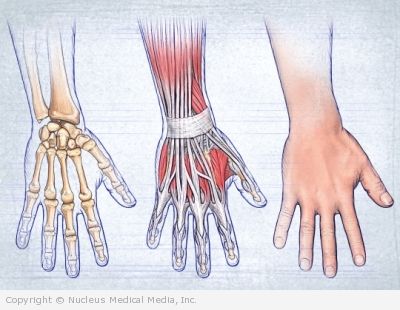(Baseball Finger)
Mallet finger – Definition
A mallet finger happens when the extensor tendon to the distal joint of the finger is stretched or torn. The extensor tendon is on the top of the finger. The distal joint is the last joint near the tip of the finger. This injury sometimes includes a small fracture of the finger.
Mallet finger – Causes
The most common cause of a mallet finger is when the tip of a finger is forcibly jammed into flexion or hit against a solid object. It occurs often in sports, such as baseball and basketball, when a ball hits the end of an extended finger. This injury causes the tendon on the back of the finger to be partially or completely torn. The tendon can no longer fully extend the distal joint.
Mallet finger – Risk Factors
A risk factor is something that increases your chance of getting a disease or condition. The primary risk factor for developing mallet finger is playing a sport or activity that exposes the finger to injury. For example, baseball and basketball.
Mallet finger – Symptoms
Symptoms of mallet finger include:
- Pain and tenderness at the distal finger joint after injury
- Swelling and redness around the distal joint after the injury
- Inability to completely extend the finger
Mallet finger – Diagnosis
Your doctor may take an x-ray of the injured finger to look for a small fracture extending into the joint. This fracture helps diagnose a mallet finger.
Mallet finger – Treatment
Treatment for mallet finger includes:
Ice
For the first one to two days, ice should be applied for 15 minutes every three to four hours to reduce swelling and tenderness. Do not apply the ice directly to the skin.
Pain Medication
Your doctor may recommend a prescription or an over-the-counter pain medication.
Splint
A splint is usually applied to the outermost joint of the finger. It keeps the finger extended and prevents it from moving during healing. The splint should be worn for four to six weeks. If you move the injured distal joint, you have to restart the immobilization time period. Following instructions for splint use is important for this injury.
Finger Exercises
You may need physiotherapy after the splint is removed. These exercises will help improve strength, flexion, and extension of the injured finger.
Surgery
In some cases, surgery may be required. This may be the case if there is a total tear of the extensor tendon. It may also be needed if there is a fracture extending into the joint where the tendon has pulled a piece of bone loose.
With or without surgery, mallet fingers often result in some minor drooping of the distal finger joint. However, you should have close to normal function and be able to play sports.
Mallet finger – Prevention
The only way to prevent mallet finger is to avoid injury to your finger.

